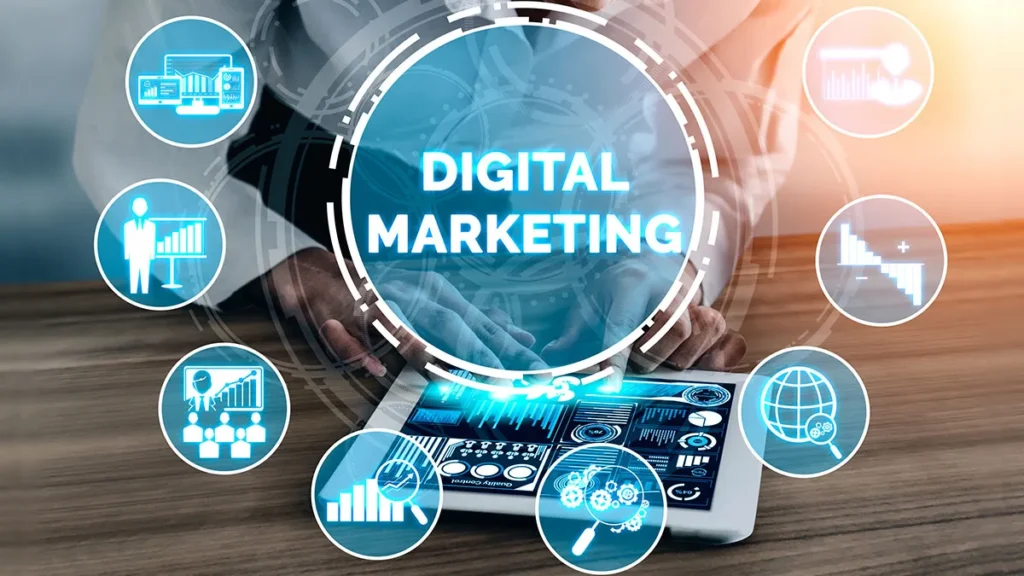How to start a digital marketing agency in the US?

Introduction
Definition of a Digital Marketing Agency
A digital marketing agency is a company that specializes in providing a range of online marketing services to businesses, including search engine optimization (SEO), social media marketing, email marketing, content marketing, and more.
Importance of Digital Marketing Agencies in the US
With the majority of consumers turning to the internet to research products and services, having a strong online presence is crucial for businesses to stay competitive. Digital marketing agencies play a pivotal role in helping businesses enhance their online visibility, attract leads, and drive sales.
Market Research and Analysis
Identifying Target Audience
Before launching a digital marketing agency, it’s essential to identify the target audience you’ll be serving. Conduct thorough market research to understand the demographics, preferences, and behaviors of your potential clients.
Analyzing Competitors
Study your competitors to identify gaps in the market and areas where you can differentiate your services. Analyze their strengths and weaknesses to formulate strategies that will give you a competitive edge.
Understanding Market Trends
Stay abreast of the latest trends and developments in the digital marketing industry. This will help you adapt your services to meet the evolving needs of your clients and stay ahead of the competition.
Business Plan Development
Defining Services Offered
Determine the range of services you’ll be offering, such as SEO, social media management, pay-per-click advertising, email marketing, web design, and more. Tailor your services to cater to the specific needs of your target audience.
Establishing Pricing Strategy
Set competitive pricing for your services based on factors such as the level of expertise, the scope of services offered, and the market demand. Consider offering tiered pricing packages to appeal to a wide range of clients.
Creating a Marketing Plan
Develop a comprehensive marketing plan to promote your digital marketing agency. Utilize a mix of online and offline marketing channels, including social media, content marketing, email campaigns, networking events, and partnerships with other businesses.
Legal Considerations
Business Registration and Licensing
Register your digital marketing agency as a legal entity and obtain the necessary licenses and permits to operate legally. Consult with a business attorney to ensure compliance with local regulations.
Contracts and Agreements
Draft contracts and agreements for your clients that outline the scope of work, payment terms, deliverables, and other important terms and conditions. Protect your interests by including clauses for intellectual property rights and confidentiality.
Intellectual Property Protection
Safeguard your intellectual property, including your brand name, logo, website content, and marketing materials. Consider trademarking your brand name and logo to prevent others from using them without permission.
Setting Up Operations
Office Space and Equipment
Set up a dedicated workspace for your digital marketing agency equipped with essential tools and equipment, including computers, software, high-speed internet, and communication systems.
Hiring Skilled Professionals
Recruit a team of skilled professionals with expertise in various areas of digital marketing, such as SEO specialists, social media managers, content writers, graphic designers, and web developers.
Implementing Efficient Workflow Systems
Establish efficient workflow systems to streamline processes and maximize productivity. Use project management tools and collaboration platforms to manage tasks, communicate with team members, and track project progress.
Building a Strong Online Presence
Developing a Professional Website
Create a professional website for your digital marketing agency that showcases your services, portfolio, client testimonials, and contact information. Optimize your website for search engines to improve its visibility online.
Utilizing Social Media Platforms
Utilize social media platforms such as Facebook, Twitter, LinkedIn, and Instagram to promote your digital marketing agency and engage with your target audience. Share valuable content, interact with followers, and participate in industry discussions.
Content Marketing Strategies
Develop a content marketing strategy to establish thought leadership and attract potential clients. Create high-quality blog posts, articles, videos, infographics, and other types of content that address the pain points and interests of your target audience.
Client Acquisition and Retention
Networking and Referrals
Network with industry professionals, attend conferences and join relevant associations to expand your professional network and generate referrals. Offer incentives for clients who refer new business to your agency.
Offering Exceptional Customer Service
Deliver exceptional customer service to exceed the expectations of your clients. Be responsive to their inquiries, provide regular updates on project progress, and address any concerns promptly and professionally.
Implementing Client Feedback
Seek feedback from your clients regularly to gauge their satisfaction levels and identify areas for improvement. Use their feedback to refine your services and enhance the client experience.
Scaling and Growth Strategies
Expanding Service Offerings
Diversify your service offerings to meet the evolving needs of your clients and stay ahead of industry trends. Consider adding new services such as video marketing, influencer marketing, or marketing automation.
Investing in Technology and Automation
Invest in technology and automation tools to streamline processes, improve efficiency, and scale your operations. Explore software solutions for project management, analytics, email marketing, and social media management.
Developing Strategic Partnerships
Form strategic partnerships with complementary businesses, such as web development agencies, graphic design firms, and PR agencies. Collaborate on projects and referrals to expand your reach and offer integrated solutions to clients.
Financial Management
Budgeting and Forecasting
Develop a budget and financial forecast for your digital marketing agency to track expenses, revenue, and profitability. Monitor your financial performance regularly and make adjustments as needed to ensure financial stability.
Tracking Expenses and Revenue
Keep detailed records of your expenses and revenue to maintain financial transparency and accountability. Use accounting software to track invoices, payments, and expenses efficiently.
Managing Cash Flow Effectively
Manage your cash flow effectively to ensure that you have enough funds to cover operational expenses and investments. Implement strategies such as invoicing promptly, negotiating favorable payment terms with clients, and securing lines of credit if needed.
X. Overcoming Challenges
Adapting to Industry Changes
Stay agile and adaptable to navigate changes in the digital marketing industry, such as algorithm updates, new technologies, and shifts in consumer behavior. Continuously update your skills and strategies to stay relevant.
Dealing with Competition
Stay informed about your competitors’ activities and strategies to identify opportunities and threats. Differentiate your agency by offering unique value propositions, exceptional service, and innovative solutions.
Managing Client Expectations
Manage client expectations effectively by setting clear goals, communicating openly, and delivering results in a timely manner. Be honest about what you can realistically achieve and provide regular updates on progress.
Conclusion
Starting a digital marketing agency in the US is a rewarding venture that offers ample opportunities for growth and success. By following the steps outlined in this guide and staying committed to delivering exceptional service, you can build a thriving agency that helps businesses succeed in the digital world.
Unique FAQs
1. How much does it cost to start a digital marketing agency?
Starting a digital marketing agency can vary greatly in cost depending on factors such as office space, equipment, staffing, and marketing expenses. It’s essential to create a detailed budget and financial plan to estimate your startup costs accurately.
2. How long does it take to establish a digital marketing agency?
The timeline for establishing a digital marketing agency can vary depending on factors such as market research, business planning, legal considerations, and client acquisition. On average, it may take several months to a year to launch and grow a successful agency.
3. What qualifications do I need to start a digital marketing agency?
While there are no specific qualifications required to start a digital marketing agency, having expertise in digital marketing, business management, and entrepreneurship can be beneficial. It’s essential to continuously update your skills and knowledge to stay competitive in the industry.
4. How can I attract clients to my digital marketing agency?
To attract clients to your digital marketing agency, focus on building a strong online presence, networking with industry professionals, offering valuable services, and providing exceptional customer service. Utilize a mix of marketing strategies, such as content marketing, social media, and referrals, to attract and retain clients.
5. What are the key metrics to track for a digital marketing agency?
Key metrics to track for a digital marketing agency include website traffic, conversion rates, lead generation, customer acquisition cost, return on investment (ROI), and client retention rate. Monitoring these metrics regularly can help you assess the effectiveness of your marketing efforts and make data-driven decisions to optimize performance.




Leave a Comment